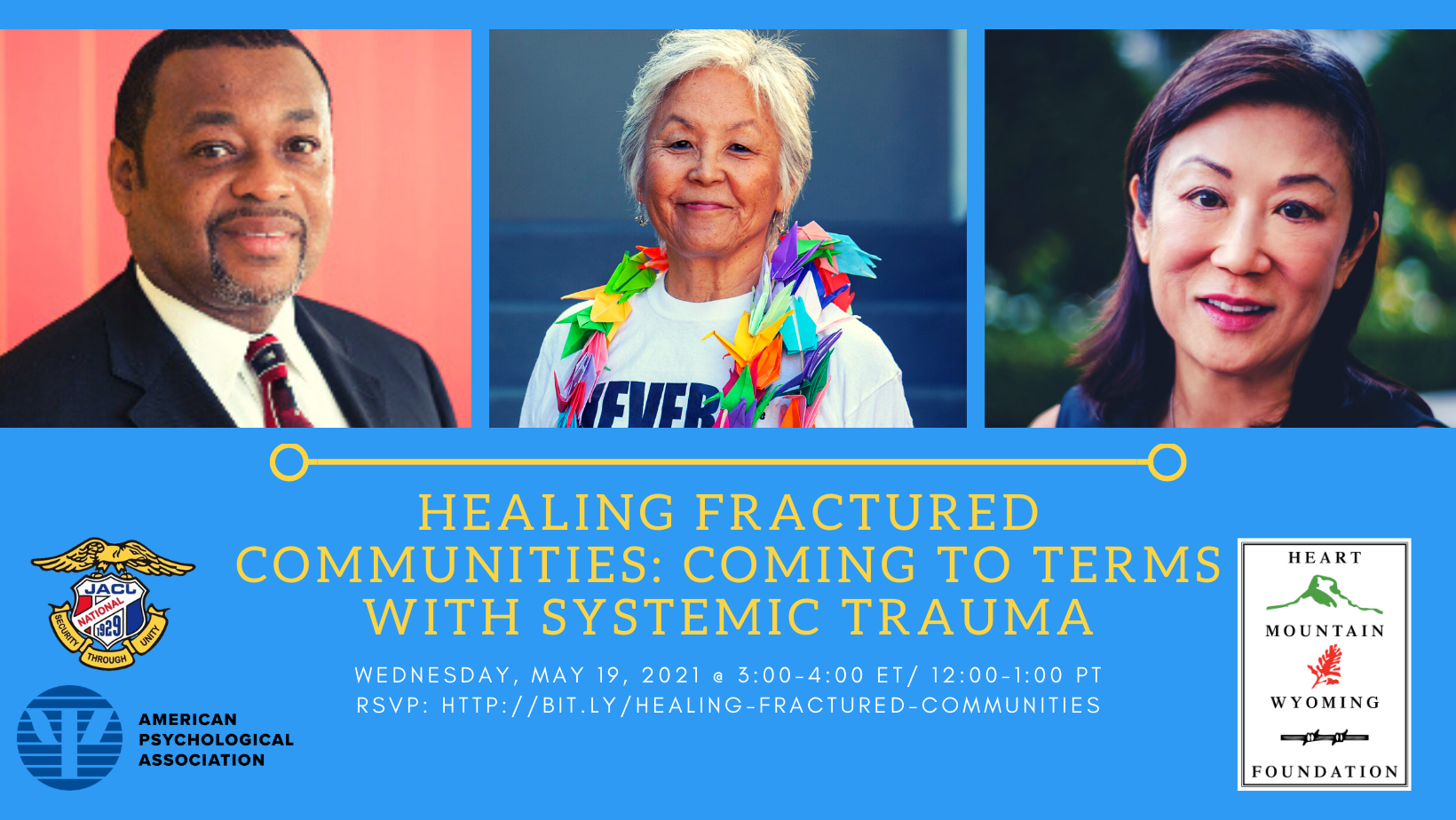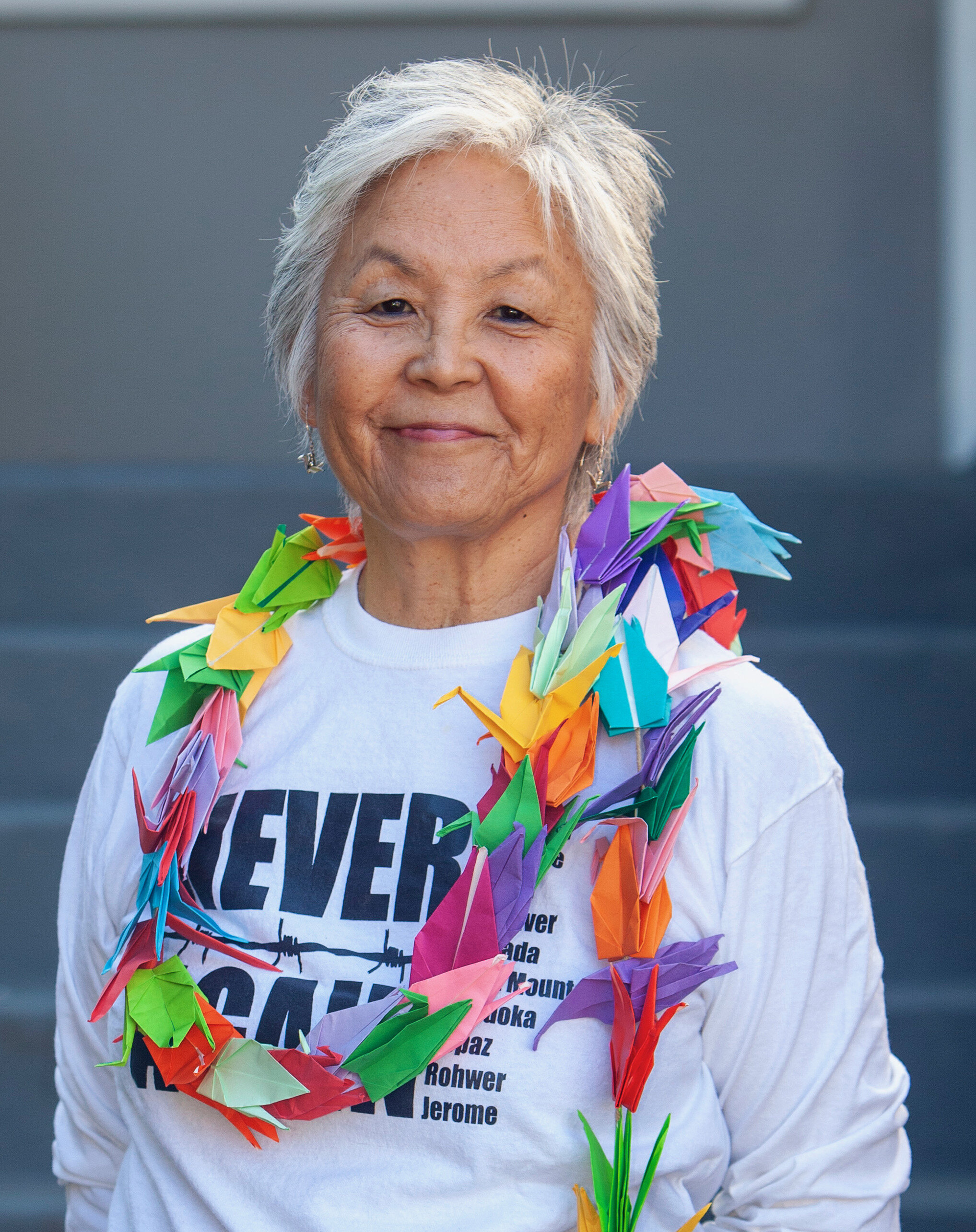Healing Fractured Communities: Coming to Terms with Systemic Trauma
While the U.S. has made public health strides with vaccinations on the rise and COVID-19 cases decreasing, the harsh reality is that anti-Asian/BIPOC violence has been increasing. It has been a year since our first discussion titled, “Lessons from the Past: Yellow Peril in COVID-19 Times,” but there is no relief in sight. A brief historical review of the anti-Asian campaigns in America that whipped up public favor for the prohibition of Chinese and Japanese immigration and the mass incarceration of people of Japanese descent during WWII brings us to where we find ourselves today. In this program, Shirley Ann Higuchi, JD; Dr. Satsuki Ina, and Dr. Arthur Evans will discuss the links between systemic racism, cross-communal trauma and how all mental healthcare workers can make a difference today. In closing, David Inoue, Executive Director of the Japanese American Citizens League, and Maysa Akbar, Chief Diversity Officer of the American Psychological Association will reflect on the discussion and consider steps we can all take.
Our Speakers
David Inoue, Executive Director of the Japanese American Citizens League
Opening Remarks
David Inoue has served as Executive Director for the Japanese American Citizens League (JACL) since July 2017. He came to JACL with a background in health care policy and administration, previously overseeing daily operations and finances for Christ House, a medical shelter for homeless persons in the District of Columbia. He previously focused on health care policy in roles at the National Association of Public Hospitals and Health Systems and the Centers for Medicare and Medicaid Services. In all the work David has been involved, he has sought to bring his passion for social justice to align with the organizations’ mission. He has also served the District of Columbia as an elected Advisory Neighborhood Commissioner representing 2,000 DC residents. He is a long time resident of the District of Columbia with his wife and two children.
Maysa Akbar, PhD, Chief Diversity Officer, American Psychological Association
Opening Remarks
Maysa Akbar, Ph.D., is a respected scientist-practitioner and APA’s chief diversity officer, charged with infusing equity, diversity, and inclusion (EDI) into the fabric of the association’s work. As the leading architect of APA’s evolving EDI framework, Akbar works with APA staff, leaders, and members to refine and build consensus for an overall plan, operationalize its goals and establish metrics to monitor and ensure progress. The CDO also serves as a spokesperson and advocate for EDI in the field of psychology, both within and outside the association.
Before assuming the CDO post, she was the founder and chief executive officer of a clinical practice based in New Haven, Connecticut, that specialized in race-based trauma. She also created a consulting firm and educational network focused on organizational cultural transformation. Her firm delivered cutting-edge programs anchored in EDI to city governments, public schools, and court systems, among other entities. Akbar’s areas of specialty include racial identity development, racism, urban trauma, and allyship, topics on which she has written research articles, books, and book chapters. Akbar is an experienced instructor and master trainer in EDI for both the medical and the broader community.
Akbar has first-hand experience advocating for the interest of psychologists while holding multiple leadership roles advancing EDI and social justice initiatives at the state and national levels. She has played an integral part in mentoring and shaping leadership development programs for early career psychologists, postdoctoral and graduate students.
Based on her expertise in EDI, Akbar was selected to serve as an APA representative at the United Nations, providing research and guidance toward the development and implementation of psychologically informed policies that respect human rights and promote human welfare. A longtime member of APA, she is a graduate of APA’s Leadership Institute for Women in Psychology and the Diversity Leadership Program
Satsuki Ina, Ph.D., Tsuru for Solidarity, co-organizer
Panelist
Dr. Satsuki Ina, Professor Emeritus in the School of Education at California State University, Sacramento, was born in the Tule Lake, California Segregation Center, a maximum-security concentration camp for Japanese Americans during WWII. She has a private psychotherapy practice in the San Francisco Bay Area specializing in the treatment of community trauma. A community activist, writer, and filmmaker, she has produced two award-winning documentary films. Currently, she is a co-founder for Tsuru for Solidarity, a nonviolent, direct action project of Japanese American social justice advocates who works to build solidarity with other communities that have experienced forced removal, detention, deportation, and separation of families; coordinate intergenerational, cross-community healing circles addressing the trauma of their shared histories. She is featured in the recent PBS series, Asian Americans that aired earlier this month. She will talk about her family history, how it has informed her work and motivated her to be part of a civil rights movement. Dr. Ina received a presidential citation from the American Psychological Association at the professional leadership conference in Washington, DC in 2020.
Arthur Evans, Jr., Ph.D., Chief Executive Officer, and Executive Vice President American Psychological Association
Panelist
Clinical and community psychologist and health care innovator Arthur C. Evans Jr., Ph.D., is CEO of the American Psychological Association, the leading scientific and professional organization representing psychology in the United States. With more than 121,000 researchers, educators, clinicians, consultants, and students as members, APA promotes and disseminates psychological knowledge to benefit society and improve lives – a mission consistent with Evans' life work.
Before joining APA in March 2017, Evans spent 12 years as commissioner of Philadelphia's Department of Behavioral Health and Intellectual disAbility Services. In that post, he led the transformation of that agency's approach to serving a wide range of individuals with complex needs. The transformation of the $1.5 billion Philadelphia system has relied heavily on public health strategies that contribute to better community health. He emphasized a data-driven, population health approach to improve outcomes for people and increased system efficiency. Over his tenure, the agency saved more than $110 million that the city reinvested in improving and expanding services and employing innovative strategies to reach more people. The work in Philadelphia has become a national and international model, with over 25 states and more than a dozen countries having either visited the city or invited Evans to speak about the Philadelphia model.
An unconventional leader, he employed science, research, community activism, spirituality, traditional clinical care, policy, and cross-system collaborations to change the status quo.
His approach gave voice to and empowered individuals and communities that have been historically marginalized. He ensured those with lived experiences were involved with every policy decision. He enlisted political and community leaders, grassroots organizations, academic institutions, and advocates in a citywide commitment to think differently about behavioral health and intellectual disabilities.
Evans has been honored nationally and internationally for his work. In 2015, he was recognized as an “Advocate for Action” by the White House Office of National Drug Control Policy. In 2013, he received the American Medical Association's top government service award in health care, the Dr. Nathan Davis Award for Outstanding Government Service. In 2017, he received the Visionary Leadership Award from the National Council of Behavioral Health and was inducted into the Florida Atlantic University Alumni Hall of Fame. His work as a strong advocate for social justice has led to his receiving three different awards named for the Rev. Martin Luther King Jr.
Evans has held faculty appointments at the University of Pennsylvania Perelman School of Medicine, the Philadelphia College of Osteopathic Medicine, and the Drexel School of Public Health. He also held a faculty appointment at the Yale University School of Medicine.
Shirley Ann Higuchi, JD, Senior Director of the Office of Legal & State Advocacy American Psychological Association
Panelist
Shirley Ann Higuchi is Senior Director of the Office of Legal & State Advocacy in the American Psychological Association’s Practice Directorate. She manages a team of lawyers focused on legal, state, and regulatory strategies to achieve optimal psychologist participation in a changing healthcare field. Topics include alternative practice models and integration, antitrust issues, health insurance exchanges, and network adequacy, Medicaid expansion, mental health parity, telehealth, and electronic health records.
She is also Chair of the Heart Mountain Wyoming Foundation. Her American-born parents were children when they were incarcerated at Heart Mountain during WWII. Shirley’s pursuit of law stemmed from her feelings of discomfort toward how the U.S. judicial system treated her parents. Her proudest moment was unveiling the Foundation’s world-class award-winning Interpretive Center located in Cody, Wyoming in August 2011 alongside journalist Tom Brokaw, the late Senator Daniel K. Inouye, Secretary Norman Mineta, and Senator Alan K. Simpson. She recently published a book: Setsuko’s Secret: Heart Mountain and the Legacy of the Japanese American Incarceration. See the website: setsukossecret.com for more information.
In addition, her office guides both state leaders, members, and external stakeholders on long-standing legal issues in psychology such as HIPAA, patient privacy, subpoenas, scope of practice, and managed care. In her 20 years directing LRA, she has overseen all of the lawsuits against managed care on which LRA collaborated with state associations, as well as major projects such as HIPAA.
Shirley contributes to various publications on issues ranging from managed care and confidentiality to parenting coordination. She completed a six-year appointment to the Judicial Tenure and Disabilities Commission for the DC Courts and upon completion of her term, served on the Federal Law Enforcement Nominating Commission. Ms. Higuchi has been the recipient of several prestigious awards including the Lever Award, the Honorable Annice M. Wagner Pioneer Award, and the United Planning Organization Community Service Award. In 2018, Shirley was honored at the Constitutional Accountability Center’s 10th anniversary.
Aura (Sunada-Matsumura) Newlin, Secretary of the Board of Directors of the Heart Mountain Wyoming Foundation
Moderator
A fourth-generation Wyomingite and fourth-generation Japanese American, Aura Newlin is an educator and public speaker whose heritage involves intertwined stories of imprisonment at Heart Mountain, Tule Lake, and Manzanar; racially-segregated military service; and hardships suffered by Wyoming railroaders who were fired because of their Japanese ancestry. In addition to serving as Board Secretary for the Heart Mountain Wyoming Foundation, Ms. Newlin is a board member for the National Consortium on Racial and Ethnic Fairness in the Courts, served on the National Steering Committee for Tsuru for Solidarity (2019-2021), and remains engaged with Tsuru for Solidarity’s Healing Circles and Reparations workgroups. She actively educates about the contemporary relevance of Japanese American incarceration, and regularly delivers presentations to legal and lay audiences around the country.
Ms. Newlin earned a BA in ethnomusicology from the University of Wyoming and an MA in medical anthropology from Case Western Reserve University, where she specialized in global health and infectious disease control. Now focusing on the anthropology of law, she is a PhD candidate at Case Western Reserve University. Ms. Newlin’s work has been profiled by the Women in Wyoming podcast and gallery exhibit; the University of Wyoming’s Featured Alumni series; and Wyoming PBS. She was named statewide Faculty Member of the Year by the Wyoming Association of Community College Trustees in 2018, and received the Community Member Award of the Shepard Symposium on Social Justice in 2021.










